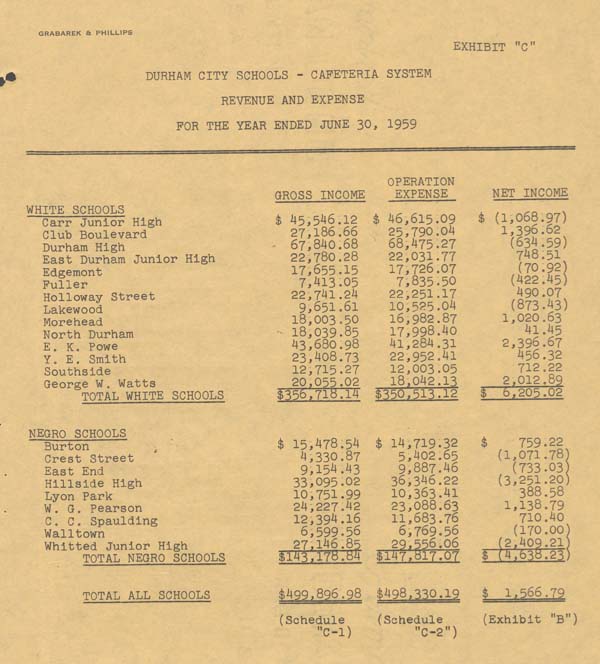Rencher Nicholas Harris was Durham’s first African-American city councilman as well as a member of the Board of Education and the Secretary for the Board of Directors of Lincoln Hospital. His papers, collected at the Rubenstein Library and now digitized, cover the scope of his civic efforts from public health to transit planning. For example, the document shown below is a budgetary analysis of Durham school cafeterias in 1959—and a prime example of how civic documents demonstrate racial realities.

At first glance, the document lists the budgets of all of the public school cafeterias in Durham, separated into white and “negro” categories. Examine the figures more closely and the depth of racism in the school segregation policy becomes clear. Compare, for example, the operation expenses of white Durham High and African-American Hillside High ($68,475.27 to $39,346.22, respectively). In addition, the white schools show a net income of $6,205.02 versus the net monetary loss of the African-American schools of $4,638.23. It is up to researchers to determine the full explanation and significance of these figures.
Fortunately, this document, along with a host of other records containing information on historic impetuses and efforts for civil equality in North Carolina, will soon become available online. Duke University Libraries’ Digital Production Center is currently participating in the Content, Context, and Capacity Project led by the Triangle Research Libraries Network (Duke, NC State, UNC, and NC Central).
This grant-funded initiative is designed to digitize selected manuscripts and photographs relating to the long civil rights movement. For more information on this project, including updates on the progress of digitization, please check out the CCC website. As part of the outreach efforts of the CCC Project, monthly blog posts to The Devil’s Tale will provide updates on the latest Rubenstein Library collections to be digitized for the project. Stay tuned!
Post contributed by Josh Hager, CCC Graduate Assistant.


